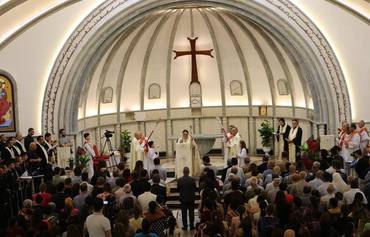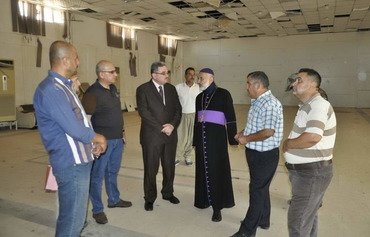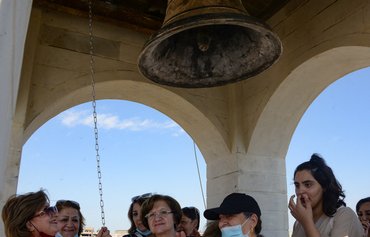Mosul's displaced Christians are being urged to return to their homes in the city and put the "Islamic State of Iraq and Syria" (ISIS) era firmly behind them.
Though it has been more than three years since ISIS was defeated in Iraq, Christians have been slow to return to their homes in Mosul, a city that once served as the group's de-facto capital in Iraq.
During its rule, ISIS viciously targeted the area's Christian community, driving out Christian families, seizing their homes and property and desecrating and destroying historic churches.
A local volunteer group, the "Mosul Arms", has taken it upon themselves to repair the city's interfaith relations by taking part in various activities that aim to show social solidarity and bring about healing.
![Iraqi Christians attend Christmas eve mass at the Syriac Catholic Church of Mar Jacob al-Muqataa in the Ninawa town of Qaraqosh, some 30 kilometres from Mosul, on December 24th, 2019. [Zaid al-Obeidi/AFP]](/cnmi_di/images/2020/12/07/27336-Iraq-Ninawa-church-600_384.jpg)
Iraqi Christians attend Christmas eve mass at the Syriac Catholic Church of Mar Jacob al-Muqataa in the Ninawa town of Qaraqosh, some 30 kilometres from Mosul, on December 24th, 2019. [Zaid al-Obeidi/AFP]
Muhammad Issam Bahaaldine, one of the founders, said his team rehabilitated the Mar Toma church in central Mosul, as part of the "Our Antiquities, Our Identity" campaign to restore seven historical landmarks.
The campaign received support from the US Agency for International Development (USAID).
Bahaaldine's team cleaned the church and fixed the lighting, he told Diyaruna, describing the repair work as "a message of love to Mosul's displaced Christians [to] urge them to return".
The volunteers hope to reassure Christians their city has been restored to its former self, "a city of co-existence that is waiting for them to return", he said.
The team is thinking about holding an event inside the church, now that it has been restored, and inviting displaced Christian families and some city notables to enhance community solidarity, Bahaaldine said.
Paving the way for return
Separately, volunteers have helped to restore 25 homes in Mosul that were destroyed by ISIS, with the aim of encouraging their owners to return, Bahaaldine said.
They continue to support all returning families, whether they are Christians or members of other religious groups, by providing them with food baskets and other necessary items and cleaning neighbourhoods, he said.
The volunteer group also is active in other projects, including providing clothes and other assistance to orphans whose parents were killed during the war to oust ISIS, and providing work for the unemployed.
Iraqi MP Yonadam Kanna, who heads the parliamentary Christian Rafidain bloc, told Diyaruna that over its 4,000 years of history, Mosul has been a home to people of many religious and ethnic groups.
"But today it is empty of this diversity for which it has long been known," he said.
Prior to ISIS rule, there were 50,000 Christians in Mosul, he said, noting that only around 100 of them have returned since the group's defeat.
This is largely due to the "negative psychological impact that the terrorists left on the psyches of the Christian population and their sense of insecurity, even after the end of the group's control", Kanna said.
He stressed the importance of societal reconciliation and the need to foster a stable environment that guarantees residents their rights, regardless of their background.
The government must protect the historical presence of Christians in the Ninawa Plains region and confront any attempts to bring about demographic changes in that area, he said.
'People should come home'
Christians from the area of Alqosh, Qaraqosh, Baashiqa, Bahzani, Bartella, Carmelos, Batnaya, Tal Saqf and Tal Keyf have in recent years trickled back to their hometowns, Kanna said.
But their numbers remain limited due to the lack of public services and scarcity of job opportunities, he said, noting that many have adapted to life in Baghdad, Erbil and Dohuk, where many of them ended up.
To facilitate their return, he said, financial compensation should be disbursed to Christians who lost their property and whose livelihoods were affected by ISIS.
George Shimoun Kaku, who heads the Ninawa Plains Charitable Association in Bartella district, said the environment is conducive to the return of Christians, and encouraged them to end their prolonged displacement.
Kaku, a businessman who runs a group of industrial companies based in Ninawa, told Diyaruna he was among the first to return to his home in Ninawa Plains.
His companies now contribute to local reconstruction and to the rehabilitation of the services sector, he said, noting that "I would not have chosen to return and resume work if conditions were not normal and stable".
"ISIS has become a thing of the past and security fears are long gone," he said, adding that people "should not think twice before coming back".

![Iraqis rehabilitate the Church of St. Korkis in Ninawa province's Bartella district on November 19th. [Photo courtesy of the church's official Facebook page]](/cnmi_di/images/2020/12/07/27241-Mosul-church-rehabilitation-600_384.jpg)






